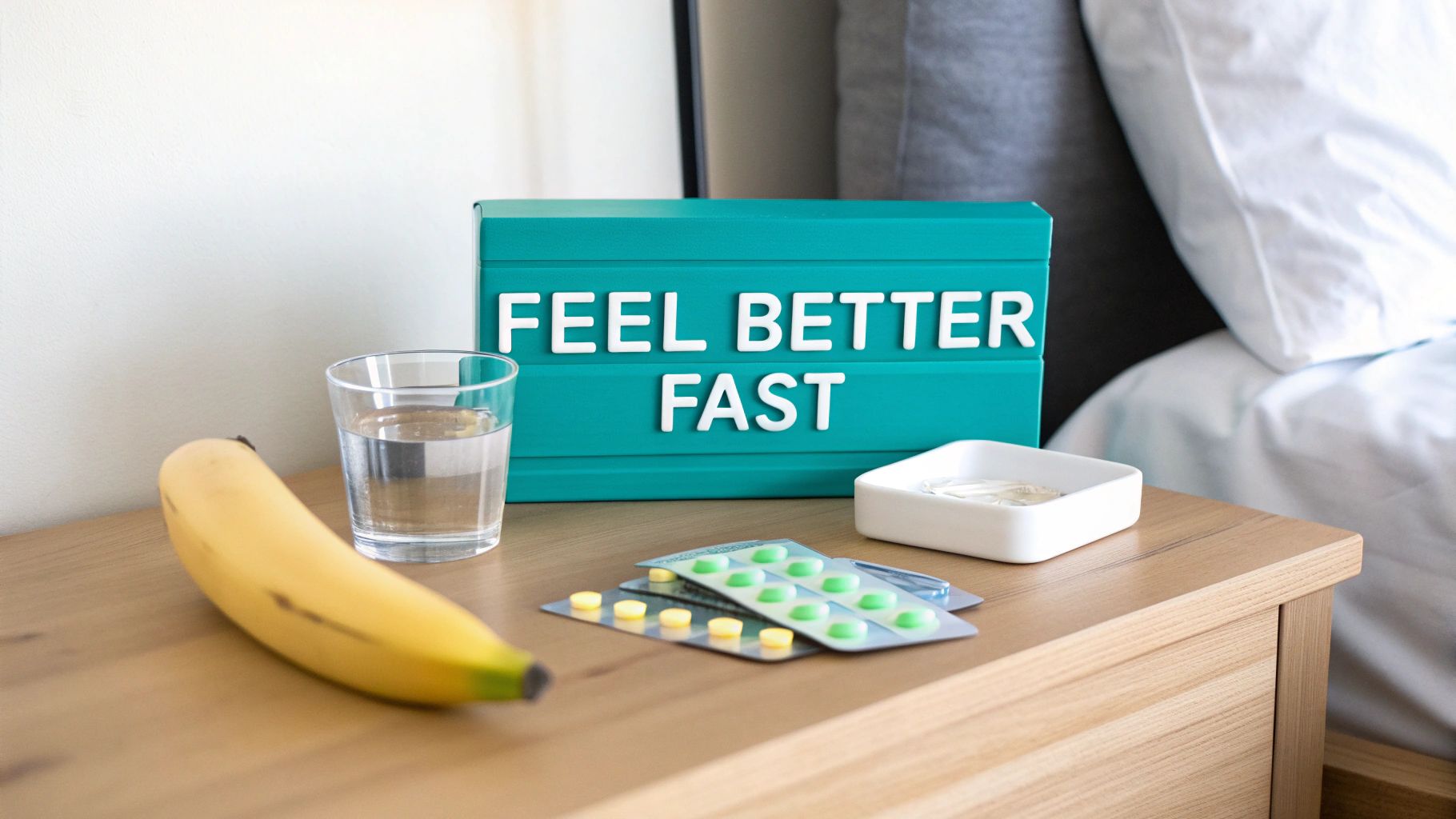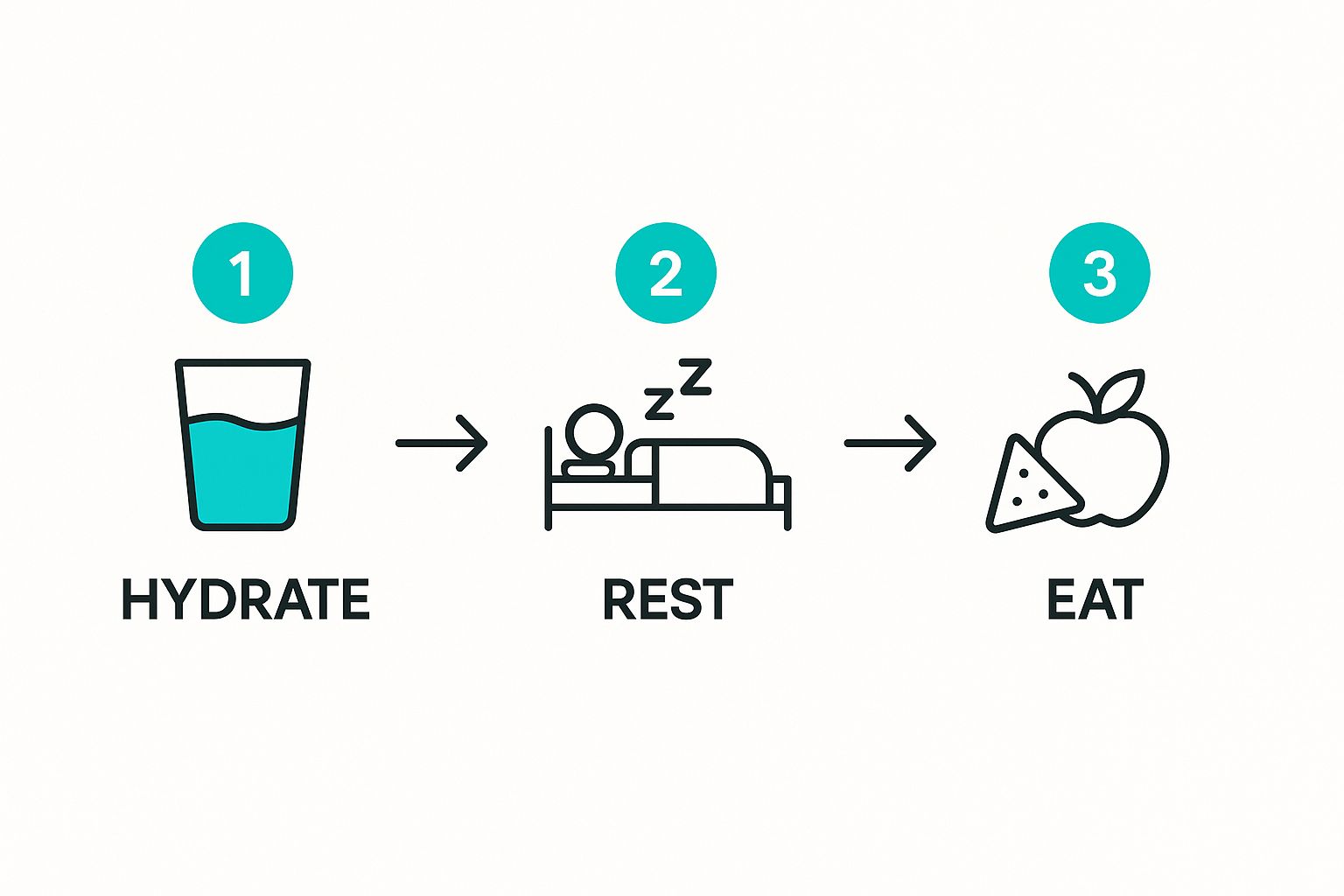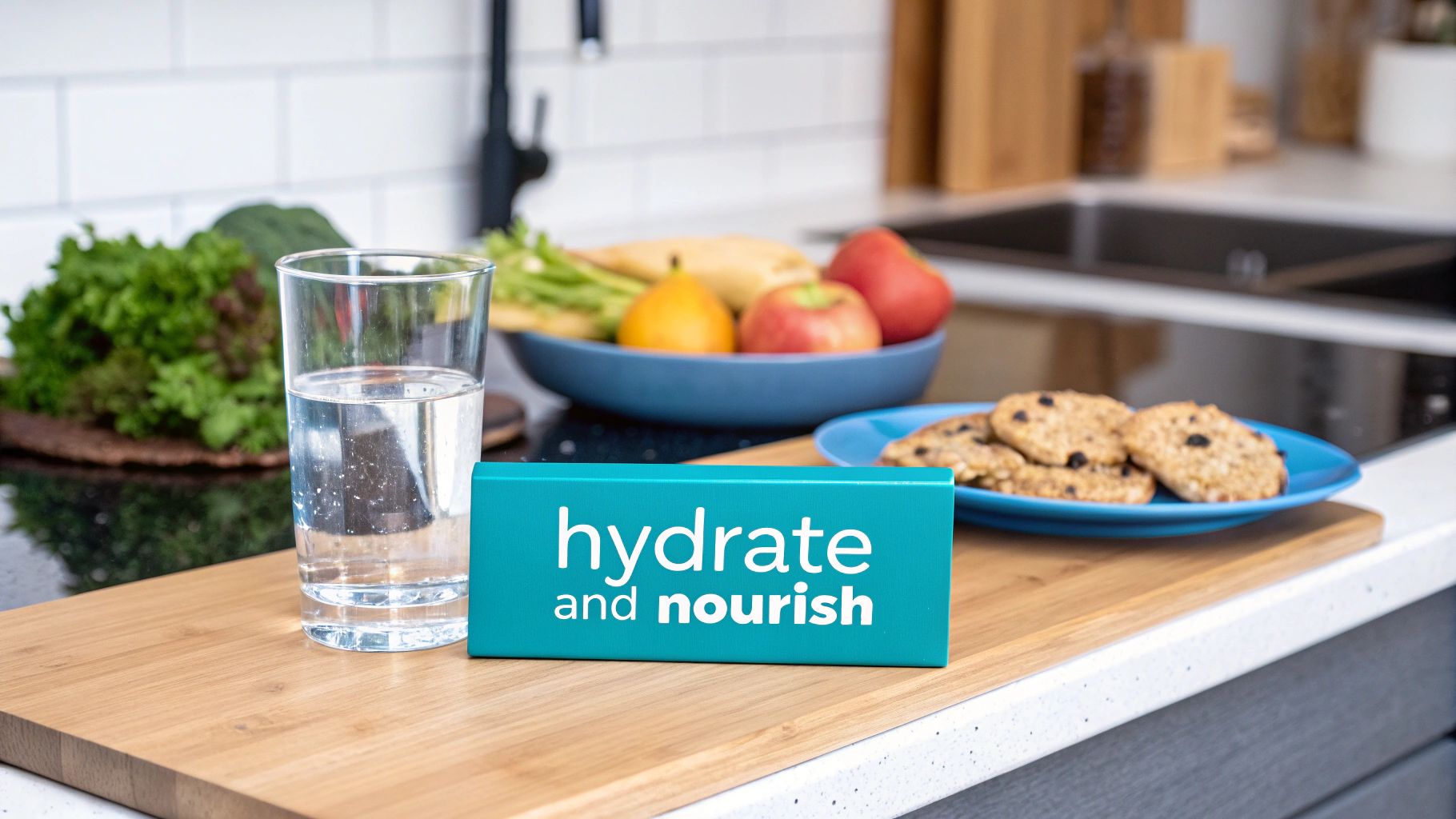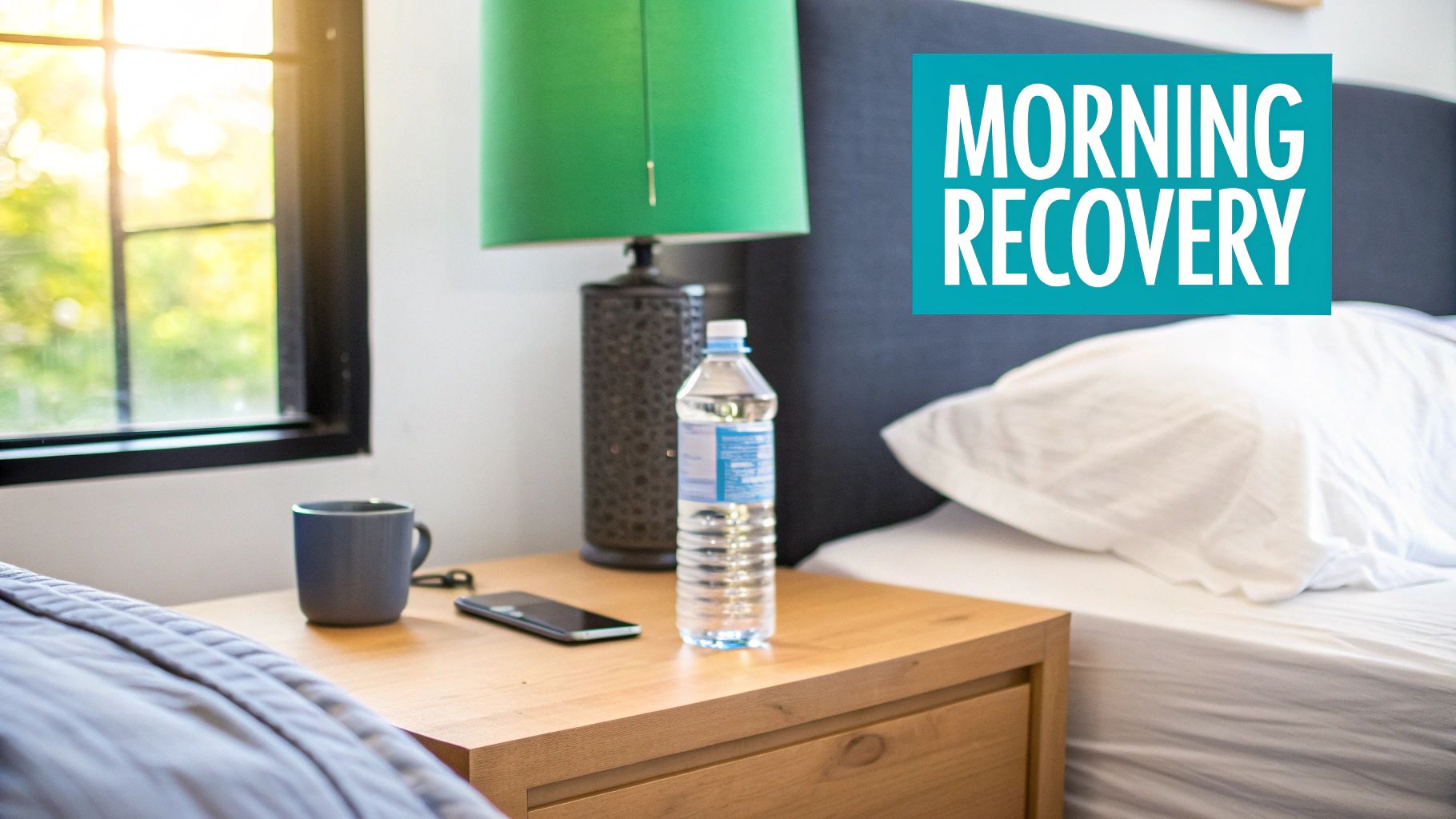

· By Annemarie
What to Do After Drinking to Feel Better Fast
When the night finally winds down, what you do right after that last drink can be a total game-changer for how you feel tomorrow. The most important things? Rehydrate with water, grab a small, stabilizing snack, and get your body ready for some quality, restorative sleep.
Honestly, these first few steps are non-negotiable. They set the stage for your entire recovery.
Your Immediate Post-Drinking Action Plan
The window to start your recovery opens the second you finish your last sip. I'm serious. What you do in that first hour can make a massive difference in how your body handles the alcohol and helps you sidestep those dreaded morning-after symptoms.
Instead of just face-planting into bed, a simple, smart routine can work wonders. Think of it as giving your body the essential tools it needs to start the cleanup process right away. This isn't about some miracle cure; it's about practical, immediate actions you can take to support your body while it's working overtime.
Before we dive deeper, here's a quick-reference table for the most critical steps to take as soon as the party's over.
Immediate Actions After Your Last Drink
| Action | Why It Helps | Quick Tip |
|---|---|---|
| Drink a Large Glass of Water | Alcohol is a diuretic, meaning it flushes water out of your system. Rehydrating immediately is key to fighting off headaches and fatigue. | Keep a water bottle by your bed so you can sip if you wake up during the night. |
| Eat a Light, Nutrient-Rich Snack | This helps stabilize your blood sugar, which can dip after drinking, and replenishes lost electrolytes. | A banana is perfect—it's easy on the stomach and full of potassium. |
| Take an Upside Hangover Stick | It’s packed with herbal ingredients like Dihydromyricetin (DHM) that help your liver process alcohol more efficiently. | Mix it with water and drink it down before you go to sleep. It’s that easy. |
| Prepare for Quality Sleep | Alcohol disrupts your sleep cycle. Creating a dark, cool, and quiet environment helps your body get the restorative rest it needs. | Dim the lights and put your phone away at least 30 minutes before you plan to sleep. |
Taking these simple actions gives your body the support it needs to bounce back faster, so you don't have to sacrifice your entire next day.
Prioritize Rehydration and Nutrients
Before your head even thinks about hitting the pillow, your number one goal is to fight off dehydration. Gulping down a big glass of water is a fantastic start. Alcohol messes with a hormone that helps your body hold onto water, which is a major reason you get those pounding headaches and feel so wiped out.
A classic mistake is caving to the craving for a greasy, heavy meal. While it sounds amazing at the time, it can seriously overwhelm your digestive system. A much better move is a light snack that's packed with nutrients.
Here are a few simple but super effective options:
- A banana: It’s easy to digest and loaded with potassium, an electrolyte that gets depleted fast when you’re drinking.
- A handful of nuts: They offer up healthy fats and protein to help stabilize your blood sugar levels.
- A piece of whole-wheat toast: This gives you complex carbs to gently bring your blood sugar back up without a crazy spike.
This simple game plan is your first line of defense.

It’s all about a clear, step-by-step approach: hydrate first, then grab a small snack to stabilize your system before you get some much-needed sleep.
Mastering Hydration and Nutrition for Recovery

It’s no secret that alcohol is a diuretic. That’s a big reason why you wake up with a pounding head and that signature, can’t-get-out-of-bed fatigue. Guzzling plain water is a good start, but you can seriously fast-track your recovery by focusing on drinks that also bring back those lost electrolytes.
Think beyond the tap for a bit. A sports drink, some coconut water, or even a simple cup of broth will do a much better job of restoring sodium and potassium than water alone. This helps your body get its fluid levels back in balance way faster, which is exactly what you need to feel human again. If you really want to get into the science of it, check out our guide on the best way to rehydrate after drinking.
But what you don't drink is just as crucial. You might be tempted to reach for coffee, but its diuretic effects can actually make your dehydration worse. And that old "hair of the dog" trick? All it really does is put off the inevitable crash.
Fuel Your Body the Right Way
Just like with hydration, your food choices can make or break your recovery. Your body is screaming for nutrients to help it process all that alcohol and start repairing itself. The name of the game is choosing foods that are easy on your stomach but still pack a restorative punch.
A few of our go-to options are:
- Bananas: They're absolutely loaded with potassium, one of the key electrolytes that alcohol flushes out of your system.
- Eggs: These are rich in an amino acid called cysteine, which is a total hero for helping your body break down acetaldehyde—a nasty, toxic byproduct of alcohol.
- Whole-grain toast or oatmeal: These complex carbs give you a steady stream of energy, helping stabilize your blood sugar so you can avoid that awful shaky feeling.
Your body needs simple, effective fuel right now. Skip the heavy, greasy stuff that can just make your stomach feel worse. Instead, opt for nutrient-dense foods that support your liver and bring your energy levels back up.
Know the Risks and When to Get Help
While these tips are perfect for bouncing back from a fun night out, it's so important to know the difference between a rough hangover and something more serious. Binge drinking—which is defined as 5 or more drinks for men or 4 or more for women in about two hours—comes with some serious immediate risks, like injuries and even alcohol poisoning.
In the U.S., excessive drinking contributes to a staggering 385 deaths every single day, with a huge chunk of those involving adults over 35. If you see someone with severe symptoms like non-stop vomiting, confusion, slow breathing, or they become unconscious, it's a medical emergency. These are all signs of potential alcohol poisoning, and you need to get help immediately.
Staying Safe After a Night of Drinking

While we're all about helping you feel better the next day, let's get one thing straight: your top priority after drinking is always safety. This isn't just about avoiding a headache; it’s about making smart choices when your judgment is taking a backseat.
And the single most important rule is non-negotiable. It requires zero debate. Never, ever get behind the wheel of a car.
Alcohol messes with your coordination, slows your reaction time, and completely clouds your decision-making. Even if you "feel fine," the risk of a tragic accident is just too high. It's a devastating issue globally—alcohol-impaired driving is linked to an estimated 27% of all traffic-related deaths each year. You can read more about the global impact of drinking habits on The IWSR.
Smart Alternatives to Driving
The good news? Avoiding this risk is easier than ever. The trick is to have a plan before you even take your first sip.
- Designate a Driver: The classic, foolproof method. Figure out who’s staying sober and will be responsible for getting everyone home.
- Use Rideshare Apps: Services like Uber and Lyft are lifesavers. Just make sure your app is updated and your payment info is ready to go.
- Call a Taxi or a Friend: Old school but still effective. Have a local taxi number saved in your phone or a reliable friend on standby who you can call for a lift.
Your plan for getting home is just as important as your plan for the night out. A few minutes of prep completely removes the single biggest danger that comes with drinking.
Expanding Your Safety Checklist
Driving isn't the only thing to worry about. Since your cognitive function is impaired, you should probably steer clear of other risky activities, too.
Operating heavy machinery, making any big financial decisions, or getting into heated arguments online are all things best saved for when you have a clear head.
And one last thing: look out for your friends. Make sure everyone in your group has a solid, safe way to get home. A quick text to check that they made it back is a small gesture that can make a huge difference. At the end of the day, staying safe is a team effort.
Navigating The Morning After Hangover

Even when you do everything right the night before, sometimes the morning after just hits you like a truck. Waking up with that pounding head and queasy stomach is your body’s loud and clear signal that it’s still working overtime to process last night’s fun. The name of the game now is gentle, effective support.
Your first thought might be to grab a painkiller, but it's crucial to choose the right one. While ibuprofen (Advil) or aspirin can help with that headache, you need to steer clear of acetaminophen (Tylenol). Your liver is already putting in a tough shift processing the alcohol, and adding acetaminophen to the mix can seriously increase the risk of liver damage.
Soothing Your System Naturally
For that awful, unsettled stomach feeling, natural remedies can be a lifesaver. Ginger has been a go-to for calming nausea for centuries. Try sipping on some warm ginger tea or even chewing a small piece of fresh ginger to help ease that queasy sensation.
Staying hydrated throughout the day is absolutely non-negotiable. But don't force yourself to chug a gallon of water if your stomach is doing flips. Instead, focus on small, consistent sips of water, an electrolyte drink, or even a light broth. The goal here is steady rehydration, not overwhelming your system.
Remember, the goal is to be kind to your body. Avoid aggressive "cures" and focus on gentle, restorative actions that support your body's natural recovery process.
Beyond the physical stuff, you might also be dealing with "hangxiety"—that awful wave of anxiety and general unease. This isn't just in your head; it's a real side effect of what alcohol does to your brain chemistry. One of the best things you can do for it is get a little light activity in.
A short, slow walk outside can do wonders. The fresh air and gentle movement help clear your head and get your circulation going, which can genuinely lift your spirits and make the whole recovery process feel way less daunting.
For a more detailed game plan, check out these 5 proven tips to cure a hangover fast.
Recognizing When Drinking Is a Bigger Issue
Knowing how to bounce back after a night of drinking is a great skill to have, but it's even more important to know when that "one night" starts becoming a regular thing. Being able to tell the difference between a rare overindulgence and a pattern that’s getting out of hand is critical for your long-term health.
It really just comes down to being honest with yourself. Are hangovers becoming a weekly event? Do you tell yourself you’ll just have one or two, but find it impossible to stop? These are often the first signs that your relationship with alcohol might need a closer look.
When to Seek Support
Noticing these patterns isn't a sign of weakness—it’s actually a huge step toward taking care of yourself. Alcohol's impact is no small thing. In 2019 alone, alcohol use was linked to about 2.6 million deaths across the globe, and more than 400 million adults were living with alcohol use disorders. You can get more details on these numbers directly from the World Health Organization's fact sheet on alcohol.
Reaching out for help is a sign of strength, not failure. If you find you're constantly relying on a recovery plan, it might be time to chat with a healthcare professional or find a support group.
Of course, being proactive can make a huge difference, too. Learning how to prevent a hangover before drinking can help you make smarter, more mindful choices in the first place. At the end of the day, putting your health first is always the right call.
So, What Actually Works After a Night Out?
When it comes to bouncing back after drinking, there’s a ton of questionable advice out there. Let's cut through the noise and answer a few common questions so you can recover smarter, not harder.
One of the biggest myths is that a huge, greasy breakfast is the ultimate cure. While it sounds amazing in the moment, piling on heavy, fatty foods can actually overwhelm your already-taxed digestive system. A much better move is to go for something light and full of nutrients, like a banana or some whole-grain toast. This will gently bring your blood sugar levels back to normal without the extra stress.
What About Those Popular "Cures"?
You’ve probably heard them all, from the "hair of the dog" to chugging a pot of coffee. Let’s get real about what they actually do.
- More Alcohol: Look, having another drink the next morning only postpones the inevitable. It doesn’t magically help your body process the alcohol already in your system and usually just sets you up for an even worse crash later.
- Coffee: A cup of coffee might give you a temporary jolt of alertness, but it's also a diuretic. This can make you even more dehydrated, which is a key reason you have that pounding headache in the first place. It’s way better to stick with water or an electrolyte drink.
The most effective recovery isn't a magic trick. It's simply about supporting your body’s natural process with the right tools: rehydration, replenishing nutrients, and getting solid rest.
So, what should you actually reach for? Foods rich in the amino acid L-cysteine, like eggs, are a fantastic choice. They help your body break down acetaldehyde, which is a nasty, toxic byproduct of alcohol. Chicken noodle soup is another winner—it helps restore both fluids and lost salts while being super gentle on your stomach. Sticking to simple, supportive strategies like these gives your body exactly what it needs to get back on its feet.
Ready to make your next morning feel a whole lot better? Give your body the support it needs with Upside Hangover Sticks. Shop now and feel the difference.
